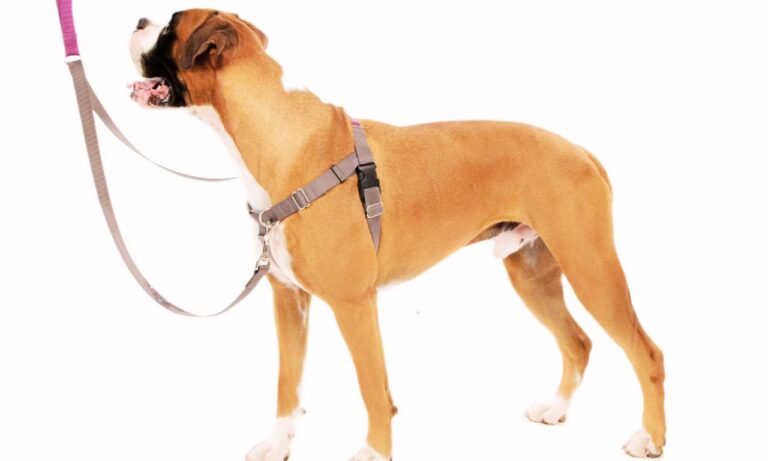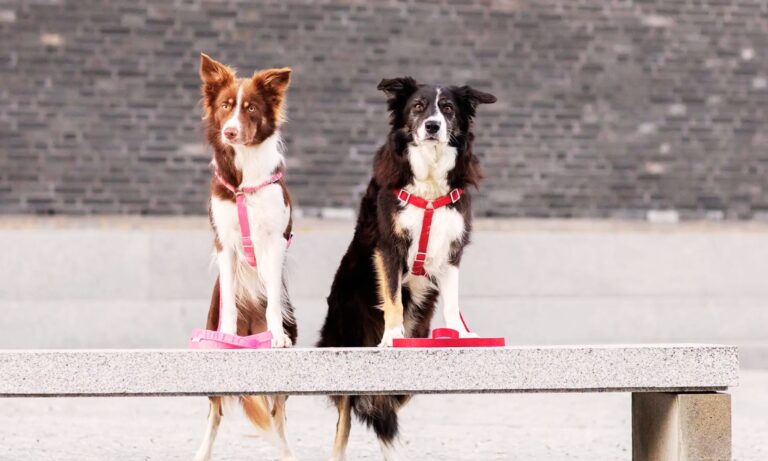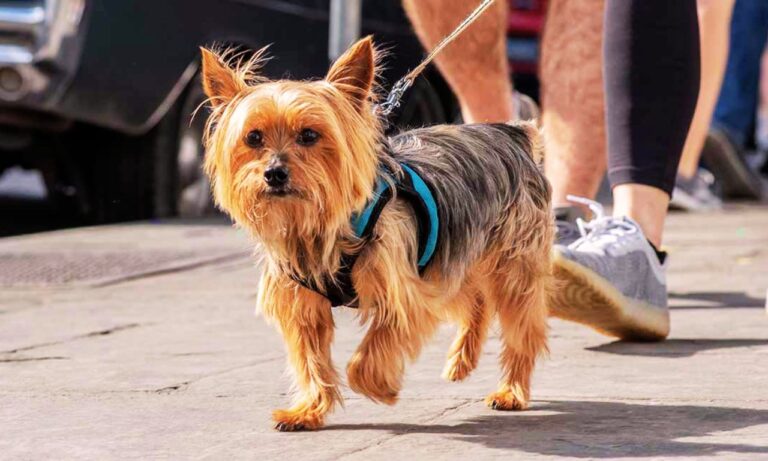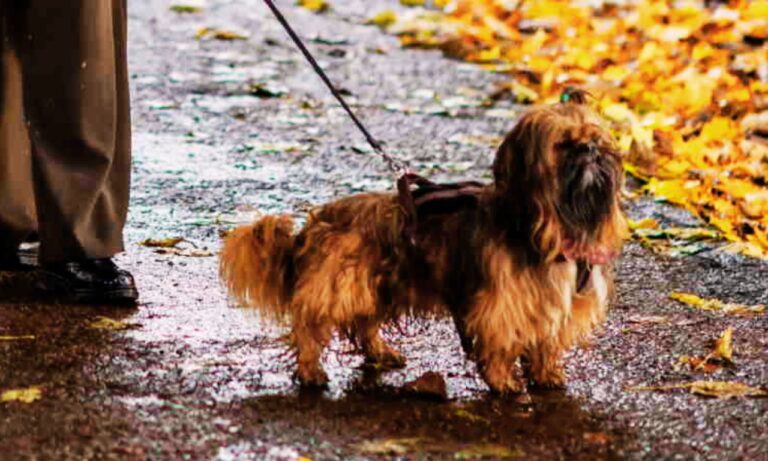Collies are renowned for their intelligence, agility, and graceful demeanor. Whether you’re a proud owner of a Rough Collie like Lassie or a Smooth Collie, ensuring your furry friend’s comfort and safety is paramount. One common question that arises is: Should a collie wear a harness? Check out the best dog collars for Border Collie to find durable, stylish, and comfortable options for your active dog.
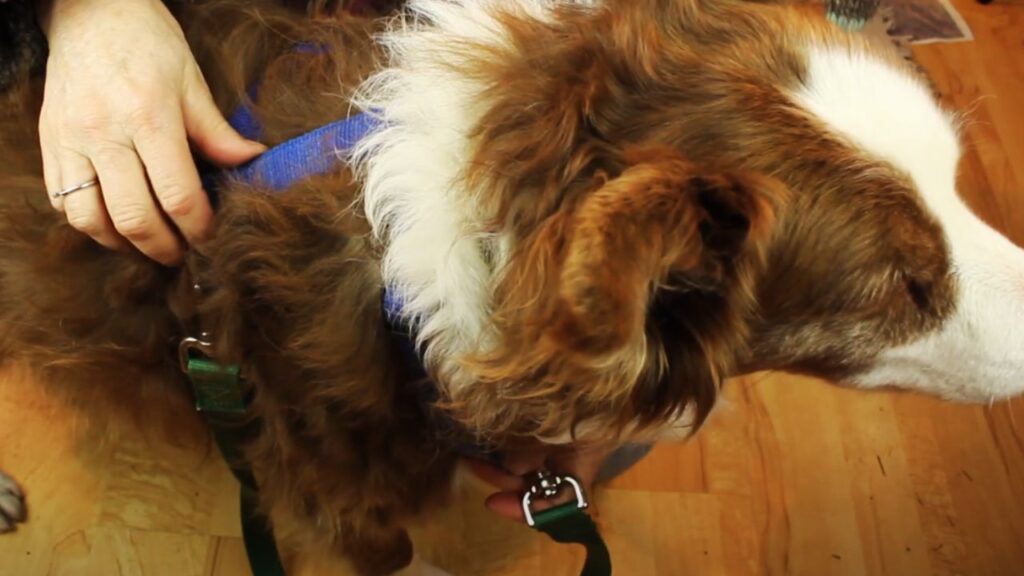
In this comprehensive guide, we’ll explore the benefits and drawbacks of harnesses for collies, compare them to traditional collars, and provide tips on choosing the right harness for your beloved pet. To discover what activities bring joy to Australian Cattle Dogs, check out this detailed guide on What Do Australian Cattle Dogs Love.
Blog Highlights
ToggleWhat Are Collies Dog Breed?
Collies, originally bred for herding livestock, are active, intelligent dogs that require both physical exercise and mental stimulation. Their strong herding instincts make them responsive to training and eager to please, but these same traits can lead to behaviors like pulling on the leash during walks.
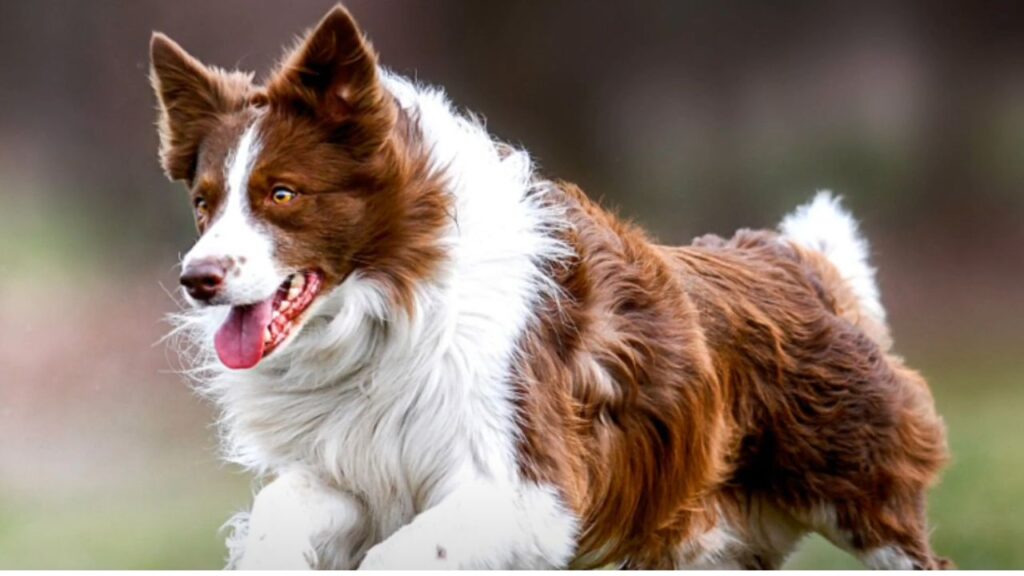
Understanding your collie’s behavior and physical needs is essential when deciding whether a harness is the right choice.
Should a Collie Wear a Harness?
So, Should a collie wear a harness? Yes, a collie can benefit from wearing a harness. Harnesses distribute pressure evenly, reducing strain on their neck and preventing injuries, especially for active or strong dogs. They also offer better control during walks and can accommodate collars for ID tags. Choose a well-fitted, comfortable harness to ensure your collie’s safety and comfort. Here’s why a Collie should wear collar:
Harnesses vs. Collars: The Basics
Before diving into the specifics of harnesses for collies, it’s important to understand the fundamental differences between harnesses and collars.
- Collars are typically worn around the neck and are used for holding ID tags, attaching leashes, and in some cases, training.
- Harnesses distribute the pulling force across the dog’s chest and shoulders, rather than the neck.
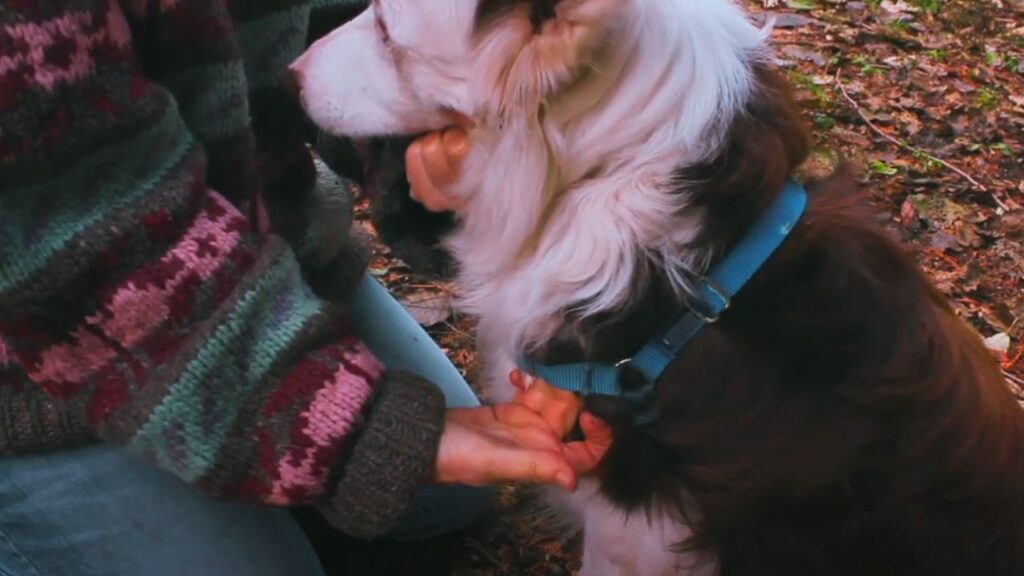
Each option has its own set of advantages and potential issues, which we’ll explore in detail. To find the ideal collar size for your Australian Cattle Dog, check out this guide on What Size Collar for Australian Cattle Dog for helpful tips on measurement and fit recommendations.
Benefits of Using a Harness for Collies
Harnesses offer better control over your collie, especially during walks or in situations where they might be prone to pulling. The design of a harness allows for more direct control over the dog’s movements without causing discomfort or injury.

1. Reduced Neck Strain
Collies have slender necks that can be prone to strain and injury if subjected to excessive pulling. Harnesses alleviate this by distributing pressure across the chest and shoulders, preventing strain on the neck and reducing the risk of tracheal injuries.
2. Preventing Escapes
Collies are intelligent and can be adept at escaping restrictive collars. Harnesses, especially those designed with escape-proof features, can provide an added layer of security, making it harder for your dog to wriggle free during walks or in enclosed spaces.
3. Assisting in Training
Harnesses can be a valuable tool in training your collie, particularly in teaching loose-leash walking. Some harnesses are designed to discourage pulling by redirecting the dog’s movement when they tug on the leash, facilitating better leash manners and overall behavior. Find out what color collar looks best on a Rottweiler to complement their bold appearance and highlight their unique features.
Potential Drawbacks of Harnesses
A harness that doesn’t fit correctly can cause chafing, discomfort, or even injury. It’s crucial to ensure that the harness is properly sized and adjusted to your collie’s body to prevent these issues.
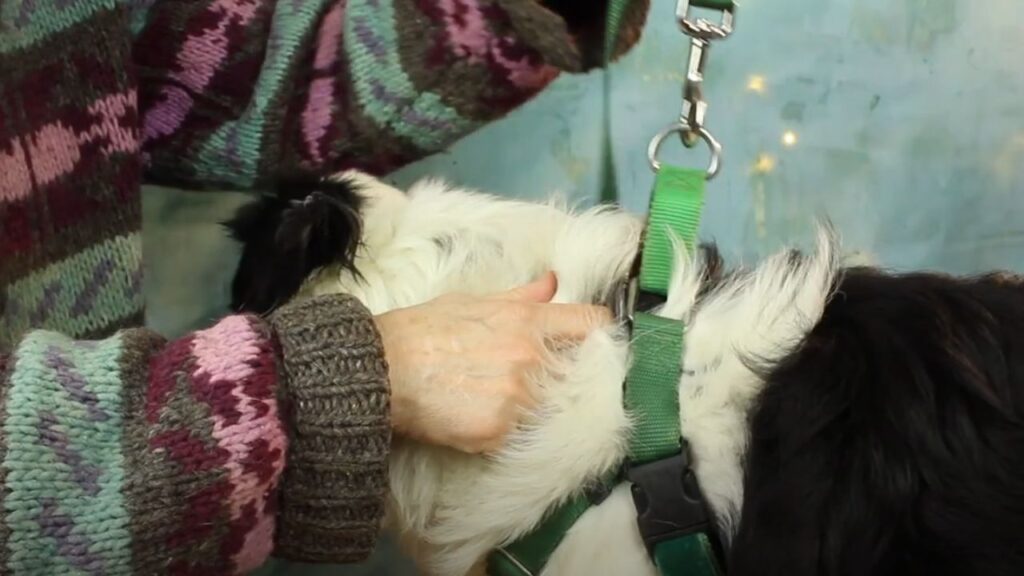
1. Limited Control in Certain Situations
While harnesses offer great control during regular walks, they might not provide the same level of precision as a collar in certain training scenarios. For instance, some training techniques may require the use of a collar to apply specific types of feedback.
2. Cost Considerations
High-quality harnesses can be more expensive than traditional collars. However, considering the potential benefits and durability, many owners find the investment worthwhile for their collie’s safety and comfort. Learn what size collar for a Rottweiler is ideal by following this detailed guide to ensure a perfect fit for your dog’s comfort and safety.
Types of Harnesses Suitable for Collies
Choosing the right type of harness is essential for your collie’s comfort and safety. Here are the most common types:
1. Back-Clip Harnesses
Back-clip harnesses have a leash attachment on the back, making them ideal for casual walks and everyday use. They are simple to use and generally comfortable for the dog, but may not be effective in controlling strong pullers.
2. Front-Clip Harnesses
Front-clip harnesses have the leash attachment on the chest, which helps in reducing pulling by redirecting the dog’s movement. This type is beneficial for training purposes and provides better control over strong or stubborn collies.
3. No-Pull Harnesses
No-pull harnesses are designed specifically to prevent pulling. They often combine front and back attachments, giving owners multiple options for controlling their dog’s movement. These harnesses are excellent for collies that have a tendency to pull during walks.
4. Step-In and Vest Harnesses
Step-in harnesses allow the dog to step into the harness rather than having it put on over the head. Vest harnesses provide extra coverage and support, making them suitable for active collies that engage in vigorous activities like hiking or running. You can learn whether Dachshunds need special collars and find expert recommendations in this article: Do Dachshunds Need Special Collars.
How to Choose the Right Harness for Your Collie
Selecting the appropriate harness involves considering several factors to ensure it meets your collie’s specific needs.
1. Measuring Your Collie
Accurate measurements are crucial for a proper fit. Measure your collie’s chest girth and neck circumference to find a harness that fits snugly without being too tight. Most harness manufacturers provide sizing charts to help you choose the correct size based on these measurements.
2. Material and Durability
Harnesses come in various materials, including nylon, leather, and mesh. Choose a material that is durable yet comfortable for your collie. Nylon harnesses are lightweight and easy to clean, while leather harnesses offer greater durability and a classic look. Mesh harnesses are breathable, making them ideal for warmer climates.
3. Adjustability and Comfort
Look for harnesses with adjustable straps to ensure a customized fit. Features like padded straps and breathable materials can enhance your collie’s comfort, especially during long walks or extended use.
4. Reflective Features for Safety
If you often walk your collie in low-light conditions, consider a harness with reflective elements. These features increase visibility and enhance safety by making your dog more noticeable to drivers and other pedestrians.
Proper Harness Fitting and Usage
Ensuring that the harness is fitted correctly and used appropriately is key to maximizing its benefits.
Step-by-Step Fitting Guide
- Measure Your Dog: As mentioned, take accurate measurements of your collie’s chest and neck.
- Choose the Right Size: Refer to the manufacturer’s sizing chart.
- Adjust the Straps: Ensure the harness is snug but not too tight. You should be able to fit two fingers between the harness and your dog’s body.
- Check for Movement: Your collie should be able to move comfortably without the harness slipping or shifting.
- Secure All Buckles: Make sure all buckles and fasteners are secure before putting the harness on your dog.
Training Your Collie to Wear a Harness
Introduce the harness gradually to your collie. Allow them to sniff and investigate it before trying to put it on. Use positive reinforcement, such as treats and praise, to create a positive association. Start by letting them wear the harness for short periods indoors before moving to outdoor walks.
Regular Maintenance and Checks
Inspect the harness regularly for signs of wear and tear. Check the straps, buckles, and attachment points to ensure they remain secure. Clean the harness as per the manufacturer’s instructions to maintain its condition and hygiene. To decide whether a collar or harness is best for your Dachshund, check out this helpful guide: What is Best for Dachshund Collar or Harness.
Alternatives to Harnesses: Are There Better Options?
While harnesses offer numerous benefits, they might not be the best fit for every collie. Here are some alternatives to consider:
1. Traditional Collars
Collars are simple and effective for holding ID tags and attaching leashes. However, they are not ideal for strong pullers or dogs with delicate necks, as they can cause strain and potential injury.
2. Head Halters
Head halters, such as the Gentle Leader or Halti, control the dog’s head and, consequently, their body. They can be effective for training and reducing pulling but may require additional training and patience for your collie to get used to them.
3. Long Lines and Leashes
Using long lines and specialized leashes can provide more freedom during walks while still maintaining control. These tools can be combined with collars or harnesses for added safety and flexibility.
Expert Opinions and Recommendations
Veterinarians and professional dog trainers often recommend harnesses for dogs that pull, have respiratory issues, or are prone to neck injuries. Dr. Emily Johnson, a veterinary behaviorist, states, “Harnesses are a safer option for many dogs, especially those with delicate necks or a tendency to pull. They provide better control and reduce the risk of injury.”
Professional dog trainers also advocate for harnesses in training scenarios. “Harnesses, particularly front-clip varieties, are excellent for teaching dogs to walk politely on a leash,” says Jake Thompson, a certified dog trainer. “They help redirect the dog’s movement without causing discomfort, making training more effective.” Discover the best collars for Siberian Huskies for both style and comfort.
Conclusion
Deciding whether your collie should wear a harness involves considering their specific needs, behavior, and physical characteristics. Harnesses offer numerous benefits, including enhanced control, reduced neck strain, and improved safety, making them an excellent choice for many collie owners. However, it’s essential to choose the right type of harness, ensure a proper fit, and introduce it gradually to ensure your dog’s comfort and acceptance.
Ultimately, the decision should be based on what works best for your collie’s individual temperament and lifestyle. Whether you opt for a harness, a collar, or another training tool, prioritizing your dog’s comfort and safety will lead to happier, more enjoyable walks for both you and your beloved collie. Hope so, now you know the answer: Should a collie wear a harness?
Invest time in researching and selecting the appropriate harness, and don’t hesitate to consult with veterinarians or professional trainers if you’re unsure. With the right harness, your collie can enjoy safe, comfortable, and enjoyable outings for years to come. Learn if it’s bad to leave a dog’s collar on all the time and how to ensure your pet’s comfort.


